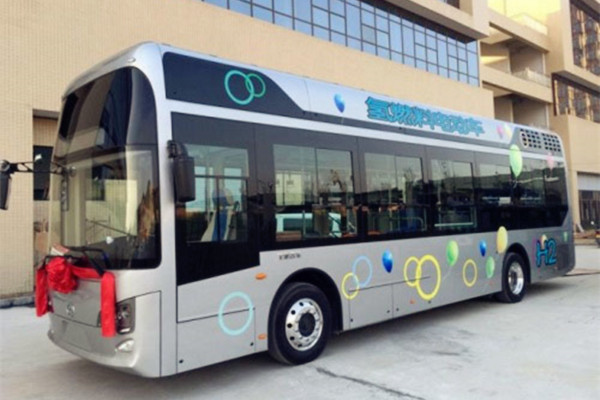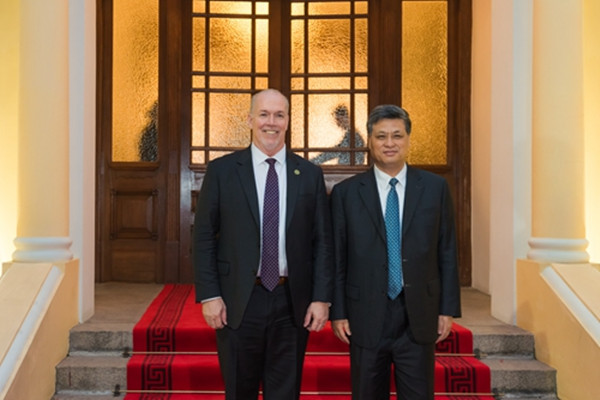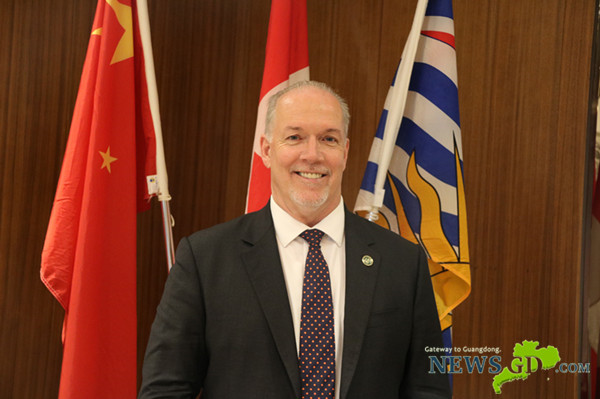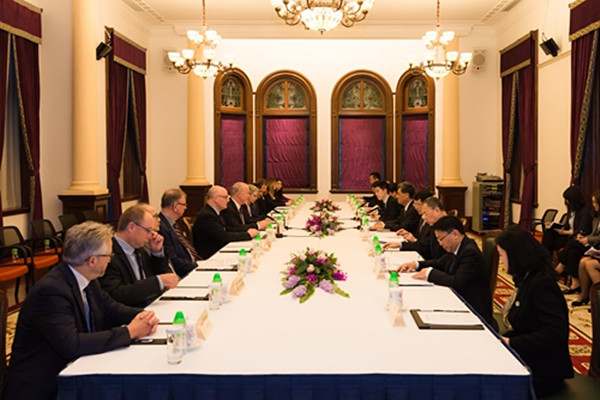John Horgan, Premier of British Columbia (B.C.), visited Guangdong recently as the first stop on his trip to Asia. Although this was his first official visit to Guangdong, John Horgan said the province had caught his attention much earlier, when he was still a young man in the 1980s.
Ma Xingrui, Governor of Guangdong, meets with John Horgan, Premier of British Columbia (B.C.).[PhotoGuangdong Foreign Affair Office]
“During my time working for Michael Harcourt, I remember he was so excited to sign the sister relationship with Guangzhou as the Mayor of Vancouver in 1985, and then took it to the provincial level with Guangdong as the Premier of B.C in 1995,” said John Horgan, “and now I have the same feeling about personally taking this relationship forward that I have had for over twenty years.”
Located in the westernmost part of Canada, B.C. is held to be the country’s gateway to the Pacific.
Long before the establishment of the sister relationship, Guangdong and this province in the far north of Canada developed ties as early as the 1880s with close connections in trading, culture and people exchange. As a result, Vancouver has become home to the second largest Chinese community in North America (San Francisco being the largest).
John Horgan, Premier of British Columbia (B.C.), accepts an interview with Newsgd.com during his trip.[PhotoNewsgd.com]
John Horgan said most of the early Chinese immigrants to B.C. came from Guangzhou, and that these Chinese Canadians have proved fundamental to the development of B.C’s economy. For example, he mentioned that George Chow, his Minister of State for Trade, was actually born just outside the airport here in Guangzhou.
“George immigrated to B.C. in 1960s. But he was not the first to the province as his great grandfather and grandfather came respectively in the 1880s and around 1911, before coming back,” said Horgon, “so I think George and his family is a symbol for the connections between our two provinces. And having him on this trip reinforces what we have done in the past and our great potential going forward.”
Before his position as Premier of B.C., John Horgan used to be a critic of energy and mining, something that he is still passionate about.
A low-carbon economy roundtable is held between Guangdong and B.C.[PhotoGuangdong Foreign Affair Office]
During the trip to Guangdong, he participated in a low-carbon economy roundtable where he met with stakeholders and saw opportunities for cooperation as China is working to reduce carbon emissions.“Today a Guangdong government official invited us to jointly create a carbon market to further drive down carbon emissions, and also take advantage of the opportunity for innovation that this presents,” said John Horgan, “I know Guangdong is leading the way with 25 percent or less use of coal than the national average, making it an ideal place for cooperation.”
In fact, cooperation between Guangdong and B.C. in the energy sector has increasingly tightened since they signed the MoU on climate change and low carbon development in 2015.
For example, Guangdong Gas Group signed a preliminary off-take agreement with Woodfibre LNG in 2016 to import 1 million tons of liquefied natural gas per year from its B.C. faculty, covering nearly half of its planned annual output. While Ballard Power Systems, a B.C.-based fuel cell solutions provider, helped produce the first fuel-cell-powered bus in Guangdong, and most recently, set up its first China office in Guangzhou.
“The planning of the Guangdong-Hong Kong-Macao Greater Bay Area will be an exciting opportunity for B.C. to work with Guangdong and run with the initiative that we’ve started.”
John Horgan said he was very pleased to hear about the Greater Bay Area at the roundtable. “When you bring together such dynamic economies as Guangzhou, Hong Kong and Macao, this is a tremendous opportunity covering hundreds of millions of people, all of their economic activities and the carbon footprint that entails.”

The first fuel-cell-powered bus is developed by Ballard Power Systems and it Guangdong partners. [PhotoSouthcn.com]
B.C. wants to continue to help with fuel replacement, and bring in its liquefied natural gas as well as new energy solutions to the Asian markets. John Horgan believed the construction of the Greater Bay Area, considered in light of previous cooperation, will make Guangdong the perfect place to start. “It's a great economic opportunity, but also an opportunity to improve our environmental outcomes,” he said.
John Horgan also took time to point out another area that has not been worked on was using environmentally renewable, sustainable building supplies. “The use of wood products— manufactured wood products, engineered wood products, is a way to reduce emissions,” said Horgan, “I would love to introduce that to the Greater Bay Area as one other element outside of energy consumption to help us in reducing our emissions.”
Reported by Jasmine Yin, Heather Lu(intern)
Edited by Simon Haywood, Olivia Ouyang



















